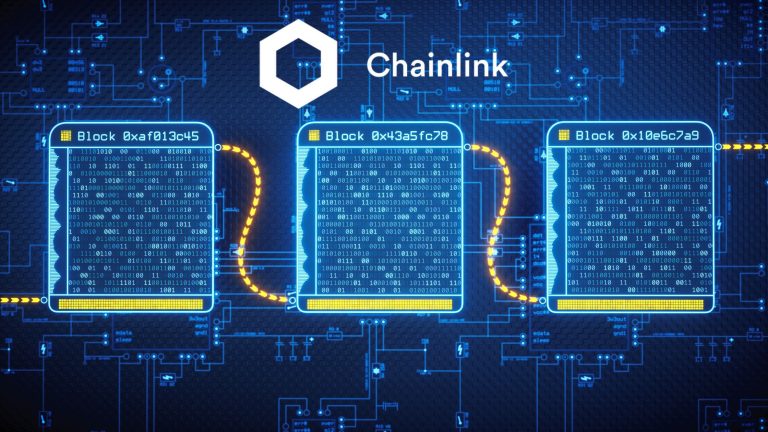As blockchain technology evolves, connecting decentralized networks with real-world data is becoming increasingly essential. Chainlink, a leading decentralized oracle network, solves this challenge by enabling secure, verified data transfer between on-chain smart contracts and off-chain data sources. This integration enhances the functionality of blockchain applications, making them applicable across industries like DeFi, gaming, and supply chain management.
This article delves into Chainlink, its key features, real-world applications, and its pivotal role in advancing blockchain technology.
Key Insights
- Chainlink acts as a trusted bridge between blockchain smart contracts and real-world data sources, enabling secure, decentralized, and verified data transfer for enhanced blockchain functionality across industries like DeFi, gaming, and supply chain management.
- Chainlink’s integrations enable transformative use cases such as real-time price feeds for DeFi platforms, automated parametric insurance payouts, random number generation for blockchain gaming, and transparent supply chain tracking using IoT data.
- The LINK token powers Chainlink by compensating oracles, incentivizing reliable data delivery, and supporting decentralized network governance, ensuring accountability and efficiency within the ecosystem.
- With ongoing advancements like the Cross-Chain Interoperability Protocol (CCIP), expanded blockchain integrations, and improved privacy features, Chainlink continues to position itself as a cornerstone of blockchain technology, empowering smart contracts to achieve their full potential.
What is Chainlink?
Chainlink is a decentralized oracle network designed to connect blockchain-based smart contracts with external data sources. While blockchains are secure and immutable, their isolation limits their access to real-world data. Chainlink acts as a trusted bridge, enabling smart contracts to interact with APIs, financial market feeds, and IoT devices.
Key Objectives:
- Cross-Chain Connectivity: Seamlessly connect blockchain applications with off-chain data.
- Enhanced Decentralization: Maintain data integrity through a decentralized structure.
- Scalability: Support high-demand applications with robust infrastructure.
How Does Chainlink Work?
It operates through a decentralized network of oracles that retrieve, verify, and deliver external data to the blockchain. Its architecture comprises three core components:
- Decentralized Oracles
Chainlink’s oracles gather data from various sources, ensuring that no single entity controls the process. This reduces vulnerabilities associated with centralized systems. - Data Aggregation
Data is aggregated from multiple oracles, cross-verified for accuracy, and presented as a single reliable data point. This eliminates inconsistencies and ensures high-quality outputs. - Reputation System
Chainlink evaluates the performance of its oracles using a reputation system. Reliable oracles are rewarded with more tasks and higher payouts while underperforming ones are penalized.
Real-World Applications of Chainlink
The ability to integrate off-chain data with blockchain networks has unlocked transformative use cases:
1. Decentralized Finance (DeFi)
Chainlink provides price feeds for DeFi platforms, ensuring accurate calculations for lending, borrowing, and trading. Projects like Aave and Uniswap rely on Chainlink for real-time data.
2. Insurance
Parametric insurance solutions use Chainlink to automate payouts based on real-world events, such as weather changes or natural disasters.
3. Gaming and NFTs
Chainlink powers random number generation (RNG) for fair gameplay in blockchain games. It also enables NFTs to incorporate real-world data, enhancing their utility.
4. Supply Chain Management
Chainlink integrates data from IoT devices to track goods across supply chains, ensuring transparency and authenticity.
The Role of the LINK Token
Chainlink’s ecosystem is powered by the LINK token, which plays several critical roles:
- Payment for Services: LINK is used to compensate oracles for their data retrieval and computation services.
- Incentives for Oracles: Oracles stake LINK as collateral, ensuring accurate data delivery and network accountability.
- Network Governance: LINK supports the network’s decentralized governance, aligning incentives among participants.
Why Chainlink Matters
Chainlink addresses a critical limitation of blockchain: its inability to access external data natively. By enabling reliable, secure, and decentralized data integration, Chainlink empowers smart contracts to achieve their full potential.
Key Benefits:
- Trustworthy Data: Ensures data accuracy through decentralized oracles and aggregation.
- Smart Contract Expansion: Enables more complex and impactful blockchain applications.
- Industry Disruption: Drives innovation across DeFi, gaming, insurance, and beyond.
Future Developments
As blockchain adoption grows, the project continues to innovate and expand:
- Cross-Chain Interoperability Protocol (CCIP)
Chainlink is developing CCIP to enable seamless communication between blockchains, further enhancing its interoperability capabilities. - Broader Integrations
Plans to support additional blockchains and expand data offerings position Chainlink as the go-to oracle solution for dApps. - Advanced Privacy and Security
Innovations in privacy and security features will make Chainlink even more reliable for sensitive data applications.
Conclusion
Chainlink is revolutionizing the blockchain ecosystem by bridging the gap between on-chain smart contracts and off-chain data sources. Its decentralized oracle network is indispensable for applications in DeFi, insurance, gaming, and supply chain management, ensuring data integrity, security, and scalability.
As Chainlink continues to evolve and expand, its role in advancing blockchain technology becomes increasingly evident. Whether you’re a developer building decentralized applications or an investor exploring blockchain’s potential, understanding Chainlink is essential to navigating the future of decentralized systems.
By empowering blockchain applications to interact seamlessly with the real world, Chainlink is shaping a more interconnected and efficient digital economy.
Follow Our Official Social Channels:
